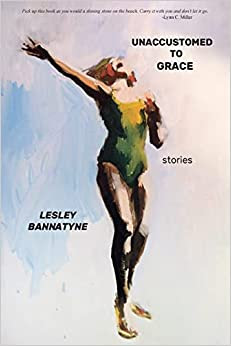REVIEW BY OFF THE SHELF CORRESPONDENT DENISE PROVOST
Unaccustomed to Grace: Stories, by Lesley Bannatyne - 2022, 161 pages - Kallisto Gaia Press - $14.95
The title of this collection of short stories invites us to ask, what is grace? Do we have it in our own lives? What would it be like to be unaccustomed to grace - to be a stranger to life’s blessings, to the genuine goodwill of others?
Bannatyne’s luminous stories introduce readers to a number of seemingly ordinary characters. These are the sort of people we might meet in our own neighborhoods, without giving them much thought. They might seem unusually wary, or conspicuously needy, but largely unremarkable.
How to account for the way that these stories pull us in? Many of them start by confounding our expectations, setting us a little off balance. The opening number, titled “Corpse Walks into a Bar,” typifies the sort of dissonance that keeps us wanting to know more.
The questions hover: is this title a joke? Is our narrator, Thomas McGahan, too sloshed to have a grip on reality? Turning pages, we come to understand the toll that grief and guilt can take on a mind’s stability. Thomas takes a night journey through his own private hell, a burial ground with “Tombstones pissed on by feral cats. Weeds. St. Pauli Girl bottles.” The reader journeys with Thomas until dawn brings its mild reconciliation.
Other stories in this collection also demonstrate how suffering in isolation often leads to distorted perceptions. These fictions portray distortion not just as an on/off switch, but as a spectrum. Short of the extremes of fantasy and hallucination, we see the lesser gradations of misperception: unwarranted distrust, suspicion, fear, despair –poisons that interfere with an open response to human caring.
Bannatyne’s gift is to acquaint us with the varieties of loss which can afflict the spirit, often invisibly. We meet a bullied student, a foster child placed in too many temporary “homes,” a girl who seeks open-ended help without mentioning physical abuse by her father. We encounter parents who have lost children, children who have lost parents, a woman who loses most of one hand.
Yet in these lucid tales, nothing is pat or formulaic. “High school smells like canned corn…” one protagonist notices. A bereaved grandmother makes elaborate plans to soot a man as soon as he is released from prison. A young man torments his brother: “What kind of guy gets beat by a girl?”
We are privy to the pain and struggle of people like us, people who could be us. They reveal their inner lives in situations described in fresh language that demolishes clichés and easy stereotypes. We learn that a pregnant teenager hates “the bullet of flesh and cartilage lodged in her uterus [that] was going to cripple her.”
In an emergency room, one nurse dispassionately observes another lifting the hair of a head-lice-infested boy “with a tongue depressor, like she had a dead rat on the end of a broom. There was a father and son burned by a barbeque smoker…the tall guy with the pretty face who comes in all the time begging for Oxy.” A young tarot card reader, sensing her mother’s disappointment, asks her “if she wants a sage cleansing and she gives me a look that could wither a trucker’s dick.”
Through the lives of Bannatyne’s characters, we see clearly that the wounds of the mind are the hardest to heal. Yet we also encounter the cumbersome effort of communication, which sometimes can draw closed-up hearts open. These little dialogues, however sharp or clumsy, reveal themselves to be the kind of grace that leads to healing.

